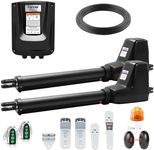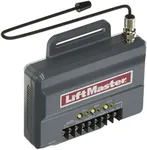Buying Guide for the Best Gate Openers
Choosing the right gate opener involves understanding your specific needs and the features that different models offer. Gate openers are designed to automate the process of opening and closing gates, providing convenience and security. When selecting a gate opener, consider the type of gate you have, the frequency of use, and any additional features that might be beneficial for your situation. It's important to match the gate opener's capabilities with your gate's requirements to ensure smooth operation and longevity.Gate Type CompatibilityGate type compatibility refers to whether the gate opener is suitable for your specific type of gate, such as sliding, swing, or overhead gates. This is crucial because different gate types require different mechanisms to operate. For instance, swing gates need openers that can handle the arc movement, while sliding gates require a linear motion. To choose the right one, identify your gate type and ensure the opener is designed to work with it. This ensures efficient operation and prevents damage to both the gate and the opener.
Weight and Length CapacityWeight and length capacity indicate the maximum weight and length of the gate that the opener can handle. This is important because an opener that is not strong enough for your gate will struggle to operate, leading to potential breakdowns. Gate openers are typically categorized by the weight and length they can support, such as light-duty for smaller gates and heavy-duty for larger, heavier gates. To select the right capacity, measure your gate's weight and length and choose an opener that can comfortably handle these specifications.
Power SourceThe power source of a gate opener determines how it is powered, which can be through electricity, solar energy, or battery. This is important for ensuring consistent operation and convenience. Electric openers are reliable but require a nearby power source, while solar-powered options are eco-friendly and ideal for remote locations. Battery-powered openers offer flexibility but may need regular recharging. Consider your location, access to power, and environmental preferences when choosing the power source for your gate opener.
Opening SpeedOpening speed refers to how quickly the gate opens and closes. This is important for convenience and security, especially in high-traffic areas where quick access is needed. Gate openers vary in speed, with some offering adjustable settings to suit different needs. Faster speeds are ideal for busy environments, while slower speeds may be sufficient for residential use. Consider how often and quickly you need the gate to operate when selecting the opening speed that best fits your requirements.
Safety FeaturesSafety features in gate openers are designed to prevent accidents and ensure safe operation. These can include obstacle detection, auto-reverse, and manual release options. Safety is crucial to protect people, vehicles, and the gate itself from damage. Look for openers with comprehensive safety features, especially if the gate is used frequently or in areas with children and pets. Evaluate your environment and potential risks to determine which safety features are most important for your gate opener.
Control OptionsControl options refer to the different ways you can operate the gate opener, such as remote controls, keypads, smartphone apps, or manual switches. This is important for convenience and accessibility. Some openers offer multiple control methods, allowing for flexibility in how you access the gate. Consider who will be using the gate and how they prefer to control it. For instance, smartphone apps offer modern convenience, while keypads provide secure access without needing a remote.













